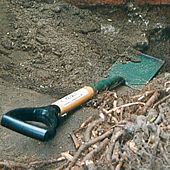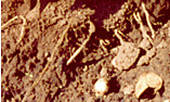So now we're going to get really deep. The brown stuff seems so basic
you barely give it a thought. You're walking on it (though most of it's
covered with concrete and tarmac) most of the time, you eat things that
grow in it, you walk under vast trees that grow in it even on the sooty
urban streets, you might be buried in it one day. Best to give it some
respect, then.
You could just dig some holes in your garden and plant things. Sometimes
a bit more effort is needed, as it was in my garden as I began to reshape
it.
The trouble with soil is that because it's all around us for free, we
just assume that it will grow things. Well, it might, but if it's anything
like the soil I had to work with in some parts of my garden, it won't
produce very good results, and some plants may give up altogether.
If you've moved into a house with a garden that has been gardened by the
previous owners, and the previous owners loved digging and manure spreading,
then you're probably okay just digging holes and planting things. Often
you find a different kind of soil, rather pale in colour, heavy, and hard
to dig, the surface so flat and compacted that it can be hard to get a spade
through it. Certainly I found that you need to put in a lot of initial
effort if your soil looks in parts like the kind you get at the edge of
shrubberies by municipal car parks - the bits that everyone walks across
when taking a short cut.
My reading on organic gardening methods and specifically soil improvement
taught me that turning the earth and incorporating organic matter was the
basis of success. (Indeed, so much 'turning earth' was involved that it's
no wonder it later became the title of this website.)
Best, I found, to tackle only manageable areas at one time. Soil improvement
costs, if you live in an urban area and have to go through that rather
odd procedure of going out to a nearby stables and paying them money for
bags of shit.
It took a fair while to see a difference from my efforts, but I did. There's
something very satisfying about digging a hole to plant something and
finding that your soil is - well - lively. With an open structure, full
of happy earthworms. (Well, I don't know if they're happy, but I assume
they prefer this kind of soil to the stuff with no spaces or interesting
bits of organic stuff in it.)
So, if you're starting a new garden, try a bit of digging. A lot of digging,
if you're the kind of person who likes coming in at the end of the day
too exhausted to speak coherently to your nearest and dearest.
If you're small, or unused to digging, get what is called by some a "ladies'
spade", more often, I think, a border spade. Don't get some enormous
great thing you can't lift. Smaller spades turn less earth at one go,
but achieve more eventually as you won't get tired so quickly lifting
something too big for you. There's probably some kind of metaphor for
life in that, but I'm too tired from the digging to work out what it is.

Above: Spade, resting temporarily by a partly-dug hole, while I nip off for a cup of tea and a cig.

